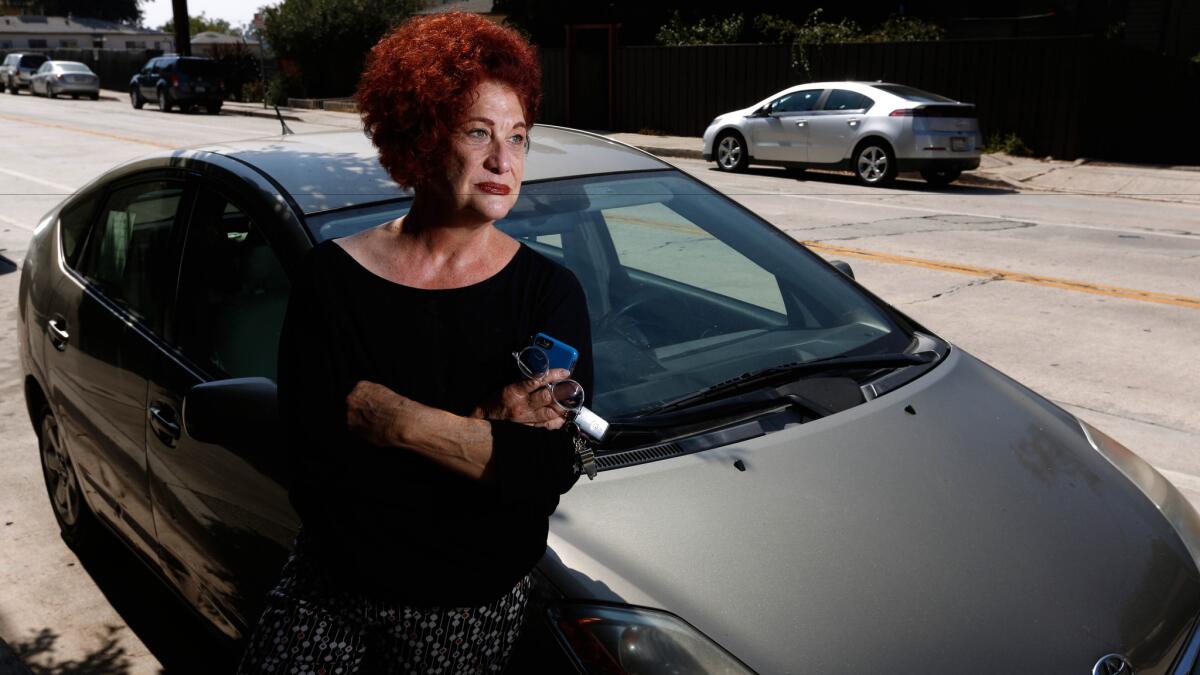Catalytic converter thefts are still smoking hot

- Share via
Thefts of automobile catalytic converters are rising in the U.S., and California drivers are the top victims.
Thefts of the antipollution devices, which reduce harmful emissions in passenger cars, SUVs and trucks, rose substantially between 2008 and 2015, according to new data from the National Insurance Crime Bureau.
Mandatory on most vehicles sold in the U.S. since 1975, catalytic converters are installed by automakers and are not meant to be removed. Vehicles from which they have been stolen do not operate properly and cannot pass smog inspections.
California had the highest number of victims by far. Its drivers were subject to 8,072 converter thefts during the reporting period — far ahead of the second-closest state, Texas, which experienced 1,705 thefts.
Those numbers may represent only a fraction of actual crimes, NICB said, since they are only based on incidents that involved an insurance claim.
Penny Peyrot of Silver Lake had the converter stolen from under her 2008 Prius late last year.
Parked on the street in front of her house, the car sounded “like it had a jet engine in the back seat” when it was started after the theft, she said.
Heather Laing-Obstbaum had much the same experience. Her 2008 Prius was also hit, in December, while parked on the same street as Peyrot’s.
“It’s a major issue here,” she wrote in an email to The Times. “The police don’t seem to know how to address the problem.”
Lieutenant Tim Torsney, of the LAPD’s Devonshire division, said thieves steal the converters because they contain small amounts of precious metals — like platinum, palladium and rhodium — they can then sell to unscrupulous salvage yards. Those metals can sell for $1,000 an ounce, and thieves can make $150 or more per stolen converter.
The Prius is particularly targeted, Torsney said, because the converter is easily accessible.
“We’ve seen them removed by crews in less than a minute,” he said.
The NICB said an “aggressive” thief can steal 10 to 15 converters a day, and placed the recycling value of the converters at $20 to $240 each.
The replacement costs substantially more. A nearby auto repair shop charged Peyrot $2,700 to replace the converter and build a steel cage around it to discourage further theft.
Armen Mahtawossian, manager of Silver Lake’s Hi Tech Automotive, said his shop saw a huge spike in converter thefts beginning in late 2015, and continuing into the middle of this year.
Almost all the thefts involved Priuses. The repairs typically cost about $2,500 — all but $300 just for the parts.
The NICB report said that almost 25,000 converter thefts were reported across the U.S. between 2008 and 2015. Their data showed 3,246 thefts in 2008 and 3,986 in 2015 — a 23% rise.
By that metric, too, California led the pack, followed by Texas, Illinois, Ohio and Georgia.
Two of the top five cities nationwide were in California. While Chicago residents suffered most, auto owners in Sacramento and Los Angeles were right behind, followed by Atlanta and Indianapolis.
Mahtawossian said that the cages his shop installs are a deterrent, but do not stop thieves.
“When they see it’s caged, they move to the next car,” he said. “But it’s not bulletproof.”
Peyrot, who works as an actor and hair stylist, may have come up with a better solution. Following her theft, she put a hand-written sign on her car — in English and Spanish — telling would-be thieves that her car is equipped with the protective cage and an alarm system.
“I get some pretty funny looks,” Peyrot said. “But my converter hasn’t been stolen again.”
Torsney said an investigation last year into the sale of converters netted the LAPD more than 900 units recovered from salvage yards that were paying the thieves for the stolen devices.
As a result, he said, converter thefts in the San Fernando Valley dropped from about 150 a year to only seven so far in 2016.
ALSO
Mercedes ‘mothership’ will transport robot workers to deliver packages
After SpaceX rocket crisis, Elon Musk also faces Tesla safety and cash-flow issues
Make big trucks and buses physically unable to speed, regulators suggest




